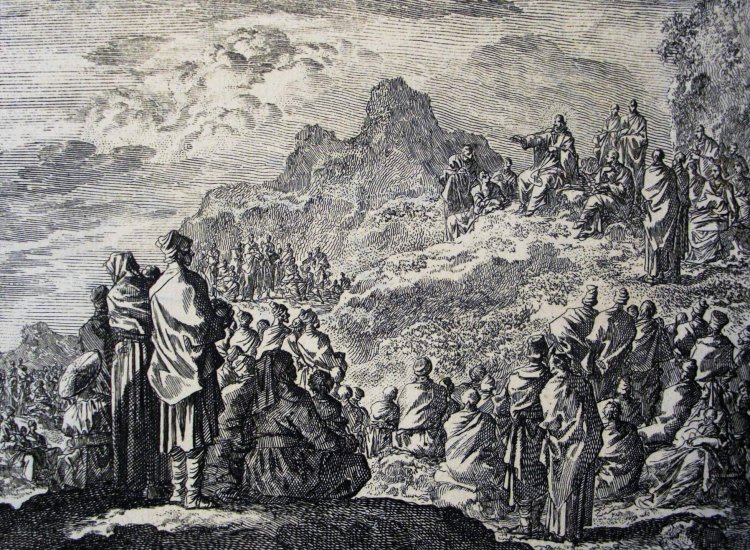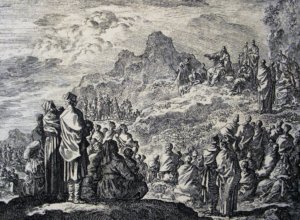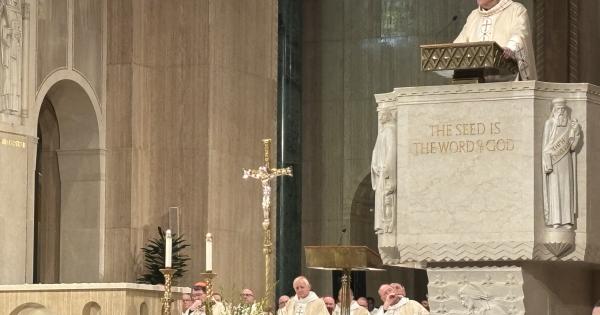When life gives you manure, maybe it’s time for changes
With this 7th Sunday after Pentecost in the Vetus Ordo Holy Church began a series of contrasts. She shows us the difference between the Kingdom of God and the kingdom of this world, between the divine and the mundane. Context […]


With this 7th Sunday after Pentecost in the Vetus Ordo Holy Church began a series of contrasts. She shows us the difference between the Kingdom of God and the kingdom of this world, between the divine and the mundane.
Context is called for. The Gospel passage in Matthew 7 is at the end of the Sermon on the Mount. It is in a series of rapid lessons, often having phrases that are part of common parlance now. The parallel passage is in Luke 6: 20-49, the much short Sermon on the Plain (on a “level place”, Greek epì tópou pedinoû). It makes sense that, were there a level place on the big hill that is supposed to be the location of the Sermon on the Mount, then the Lord, standing below with the crowds remaining above, could have been heard more easily by a larger group, as if in a natural amphitheater. Both accounts in Luke and Matthew contain strong admonitions about what happens to people who are not right with God.
Today in both the Epistle from Romans and the Gospel we have contrasts of genuine Christianity and false Christianity, true life and false life, the life of vice and the life of virtue. Hence, we are being asked a question by Christ, speaking in the words of Scripture, speaking in His own voice recorded by the Apostle Matthew who was present, proffered solemnly and in a sacrificial way in the sacred precincts of a church during the most precious of our rites, Holy Mass. That question: Are you Christian in only words or appearances or are you Christian in facts, deeds, reality?
Paul wrote to the Romans who had a pagan past. With conversion, they were to live a new life, not just a veneer of Christian over the old life. The death Paul refers to, which results from being slaves of sin, is eternal death and not the mere passing of the body after earthly life. In drawing the contrast, both Paul – and the Lord in the Gospel – pointed at outcomes. Paul used the image of wages and gifts. On our own, by ourselves, left to our own self-referential devices, we earn wages, but those wages are deadly, mortally damaging. On the other hand, God gives a gift, which is eternal life. It is not merited. That doesn’t mean that we don’t have to strive for the gift, to try to be proportioned to receiving it. We don’t, can’t, earn it. But we can conform ourselves to the gift. We can make ourselves more receptive to it.
Paul, writing to the Romans, famously penned, “the wages of sin is death”. In the Gospel pericope from Matthew 7, our Lord used the imagery not of wages, which come after working and patience, but fruits, which come after working and patience. Again, the Lord presented us with a contrast to get at outer appearances and reality.
The “wolf in sheep’s clothing” is by now a common place image for everyone, as is the phrase “a tree is known from its fruits”. Some fruit trees look magnificent in the spring. They flower, and they are a great pleasure. That beauty is a good thing in itself. However, in the autumn, all things being adequate regarding wind, water and pests, some of those once nifty trees don’t bear the fruit which their flowering foretold. Outwardly they were great, they put on a great show. But when it came right down to their purpose, their final end which is good fruit, they were empty, barren and false. Secondarily they are ”flower trees”; their primary role is fruit bearing. Ergo, they are bad trees.
There are bad trees who say, “Lord Lord”, full of pious sounds and even actions, but inside are false: our Lord saved His harshest words for hypocrites. He calls them whited sepulchers (Matt 23:27). Remember how, in a parable (Matt 18:21-35), the Lord describes how the master deals with the servant whose debts he forgave after that servant went without mercy after fellow servants who owed him? Along with the reception the foolish virgins received from the other side of the door (Matt 25:12), one of most frightening passages in the Gospels is from Luke 6:23-28 (in the Sermon on the Plain, by the way):
Some one said to [Jesus], “Lord, will those who are saved be few?” And he said to them, “Strive to enter by the narrow door; for many, I tell you, will seek to enter and will not be able. When once the householder has risen up and shut the door, you will begin to stand outside and to knock at the door, saying, ‘Lord, open to us.’ He will answer you, ‘I do not know where you come from.’ Then you will begin to say, ‘We ate and drank in your presence, and you taught in our streets.’ But he will say, ‘I tell you, I do not know where you come from; depart from me, all you workers of iniquity!’ There you will weep and gnash your teeth, when you see Abraham and Isaac and Jacob and all the prophets in the kingdom of God and you yourselves thrust out.
When our judgment comes, and it will come, what will it be? “Lord! Lord! I went to Mass on Sunday! I believed the Church’s teachings!” Could the Lord say, “I don’t know you, where you come from. You didn’t come from my Heart, my Kingdom. Your actions and motions were correct outwardly correct, but inwardly, did you ever truly love me? Enough to give me your all?”
Sometimes fruit trees can be helped. They can be given a chance to bear fruit. Permit a personal anecdote. I once lived in a place where there was a beautiful apricot tree in the back yard. One day, the ninety-something groundskeeper was out there beating the trunk with a baseball bat. Startled at this clear act of berikokophobia, I asked him why he was beating that tree. He patiently explained to ignorant me that that tree had not borne fruit for a couple of years and sometimes applying a little stress to the tree shocks it into making an effort to reproduce through bearing fruit. This is a somewhat different approach than that of the gardener in the Parable of the Barren Fig Tree in Luke 13:6-9. The Master wants it cut down, but the gardener says, let’s dig around it and put manure on it and wait a year, before chopping it down.
Distress in life is not a mark of God’s disfavor. It is a sign of His presence and love. When you suffer, He is there suffering with you. When life gives you manure, maybe it is a sign that you have changes to make to start bearing good fruit. If you have a sense that God’s door is closed on your face, it’s time to get it right with Him before that key completes its locking turn.
Hardship, deprivation, suffering, challenges are not always only mere evils to be endured. Sometimes they are needed corrections, cures, even coercions allowed or provided by God to help us get to the truth of who we are.
Take on some penances and examine your consciences. It really isn’t going to do you any good in the long run to avoid your inner faults, the inner wolves we all harbor at times. It doesn’t do us any good in the long run to ignore the fruitless aspects of our lives, the half-love and the semi-trust and the tepid heart, when with some efforts and God’s graces we can be consistent inwardly and outwardly with the identity we profess each time we say… Credo in unum Deum… I believe in One God the Father Almighty….














